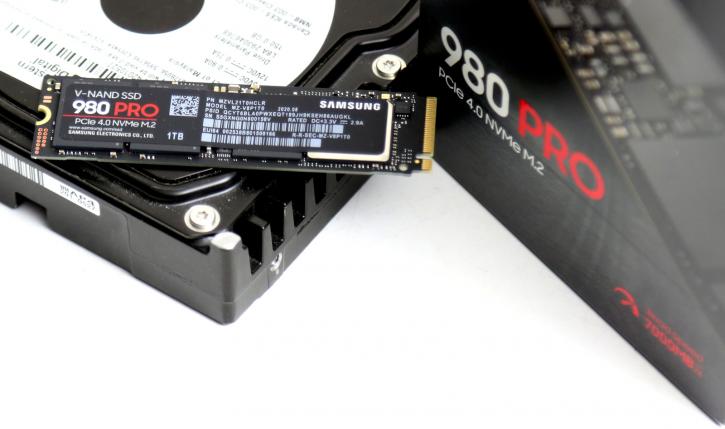Final Words & Conclusion
Final Words & Conclusion
You know, I have been thinking long and hard over this one question, what would I personally prefer, peak read speeds at that 6 to 7 GB/sec range or endurance? And I think that most end-users will agree with me, endurance should have been the leading factor the Samsung PRO models. I am not dismissing that this is a super-fast product of course, but there are so few workloads that where I would need that 6 to 7 GB/sec in read performance. Most people in the past will have purchased a PRO just for that feeling of extra security that their storage data remains very safe with extended endurance. I think Samsung made a calculated mistake or took that risk here as to how important that is for end-users. Also, it seems that the sole focus of the PRO series was to reach top numbers in benchmarks. And while it does that, the more generic workloads show a completely mixedpicture for the 980 PRO. See, the reality is that we can hit 6.5 maybe 7 GB/sec, but only in restricted and refined workloads, for the rest of it, the behaviors is not any different compared to a proper PCIe Gen 3.0 or 4.0 NVMe SSD. Where would you write 5 GB/sec? Well, I can think of only a few situations, say 4k/8K video editing, encoding and transcoding, and at such a workload. The 980 PRO performs excellent here, but especially in such heavy write workloads endurance pops back up as a huge factor. So yeah, I have been battling my own thesis here and I understand you might not agree with me. But it is clear that the 980 PRO is more of a peak performance storage unit in very specific workloads and more of a 'normal' NVMe SSD in regular workloads. So yes, endurance is weird. As to why this call is made I can't factually explain, however, I noticed a trend with our SSD reviews that when NAND layers increase, the endurance goes down. The 128-layer SSD seems to fall back to lower endurance values. Perhaps NAND stacking has that issue as an expense.
Performance
Of course, we also need to acknowledge that Samsung offers a super-fast product on the NVMe platform. No matter what workload you'll have it'll be plenty fast enough for anything you need to do one a standard workstation or gaming PC, The overall throughput of the NVMe SSD is splendid but not far off from regular Gen3.0 x4 NVMe SSDs. We cannot see the SSD hit a TLC write hole anytime fast thanks to the dynamic pSLC buffering. Thus overall is a very strong contender offering all the perf you need really.
Prices
The pricing of these NAND SSDs have gone down already, but are fluctuating almost per week. This 1TB model that we have tested can be spotted for roughly 227 /EURUSD. NVMe based M.2. have been growing and advancing in performance really fast with NAND, combine it with a proper controller, and you can get enthusiast-class performance.
- 250GB: £82.99 / 90 EUR
- 500GB: £135.99 / 149 EUR
- 1TB: £207.99 / 227 EUR
TLC Write holes
Technologies like TLC and QLC face some challenges writing more bits per cell of NAND, we, however, did not notice a dropoff in performance with mixed heavy workloads, so the dreaded TLC write hole did not kick in (and I do mean continuously sustained/linear writes minute after minute). See when then the SSD buffers are full and start to write directly to TLC NAND that could be an issue. This, in a nutshell, is what you need to be aware of with TLC and QLC SSDs. IOPS performance is good on this unit, really good. The overall workload traces also indicate this SSD to be extremely capable and fast. TBW values are average for a PRO model. 600 TBW for the 1 TB model. Albeit how companies calculate or test these values these days, is a bit of a mystery. A listed TBW value, however, is something you can pin them on warranty wise.
Concluding
The Samsung 980 PRO series is an impressive drive, however, it managed to impress me less than the release of the 970 PRO. The focus for Samsung has been clear, reach a peak read speed of ~7 GB/sec and ~5 GB/for writes. You'll only hit these numbers in very specific workloads, mostly sustained and linear writes. Also if you want to copy at 5 GB/sec to the Pro, surely your host/client setup should be the same. So you'll be hardpressed to reach these numbers in a real-world scenario. When we look at trace performance and other write workloads, the performance still is terrific, but more in line with a premium PCIe gen 3.0 or 4.0 SSD. That is the reality. Ergo this is why I deem that endurance metric to be of such important value to the end-user. For servers, content creators, and video editors the peak values might be enticing, but here again, I might even opt a 970 PRO over the 980 PRO for just the sole reason being that doubled endurance TBW value. Yeah, I know, this is a bit of pandora's box to explain and justify. But I do hope my message gets across, Samsung should not have forfeited on TBW values this much for the PRO series, at least that is my humble opinion. I'll hush now. In the end, we think that the new 980 PRO is a superb series for high-end workstations and game PCs if priced right that is. It offers good and strong read/write values, plenty fast for any gamer. It does run hot under a hefty load so please do place it under a heatsink (most if not all new motherboards offer this at default). We did not notice any TLC write hole, meaning this thing can write full speed close to 5GB/s even with a 100 GB file. The 980 PRO series will offer loads of performance but behaves more normalized in complex workloads that are not sustained. Paired with a 5-year warranty or 600 TBW reached you should be safe regardless of my endurance remarks. It is an enthusiast-class NVMe SSD and currently the fastest kid on the block in specific workloads. The competition this year will get tough for Samsung though, we have seen Phison announce some really interesting stuff. In the end, all that completion will drive up performance at many levels, and lower cost. That's a good thing.
- Sign up to receive a notification when we publish a new article
- Or go back to Guru3D's front page



